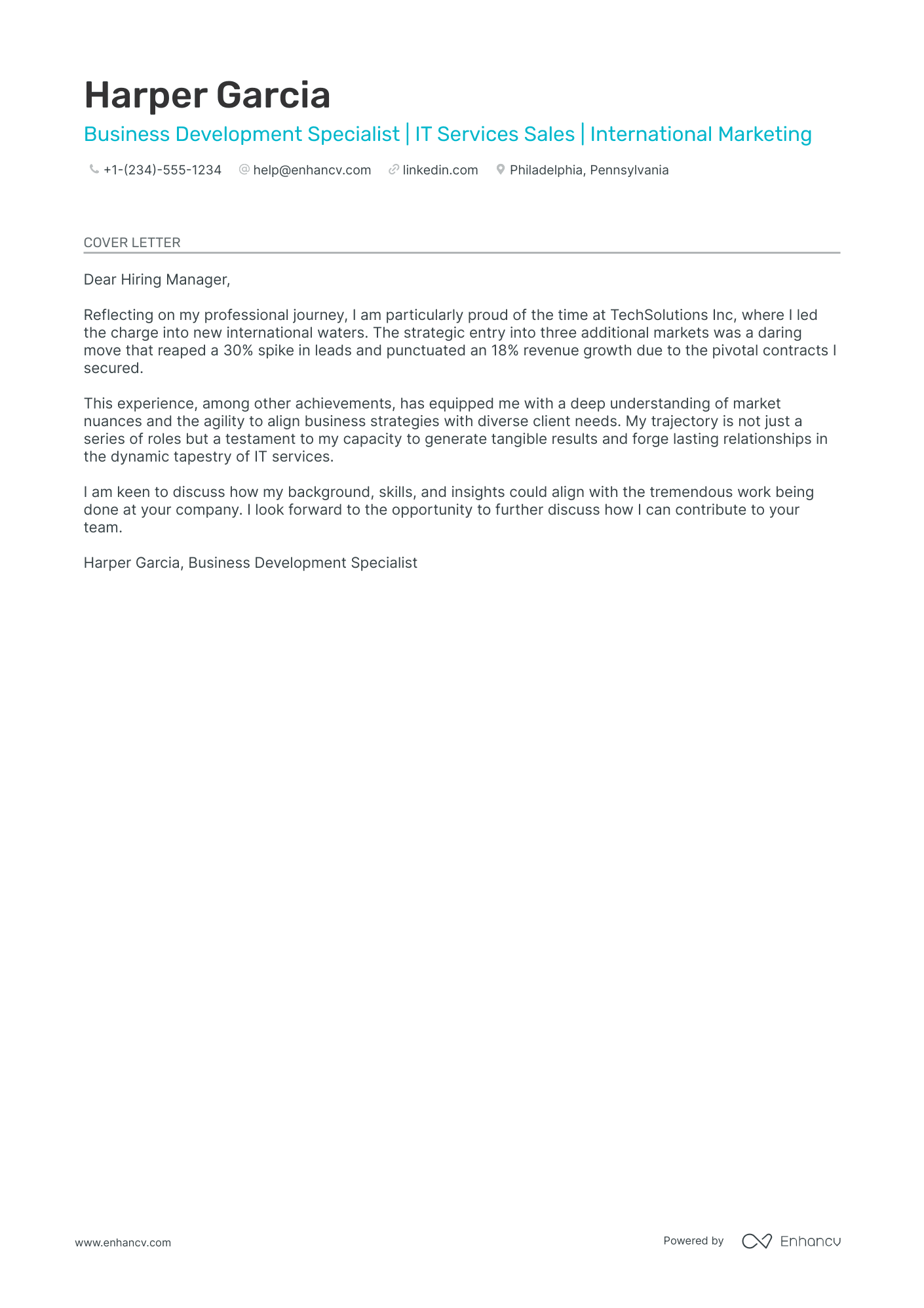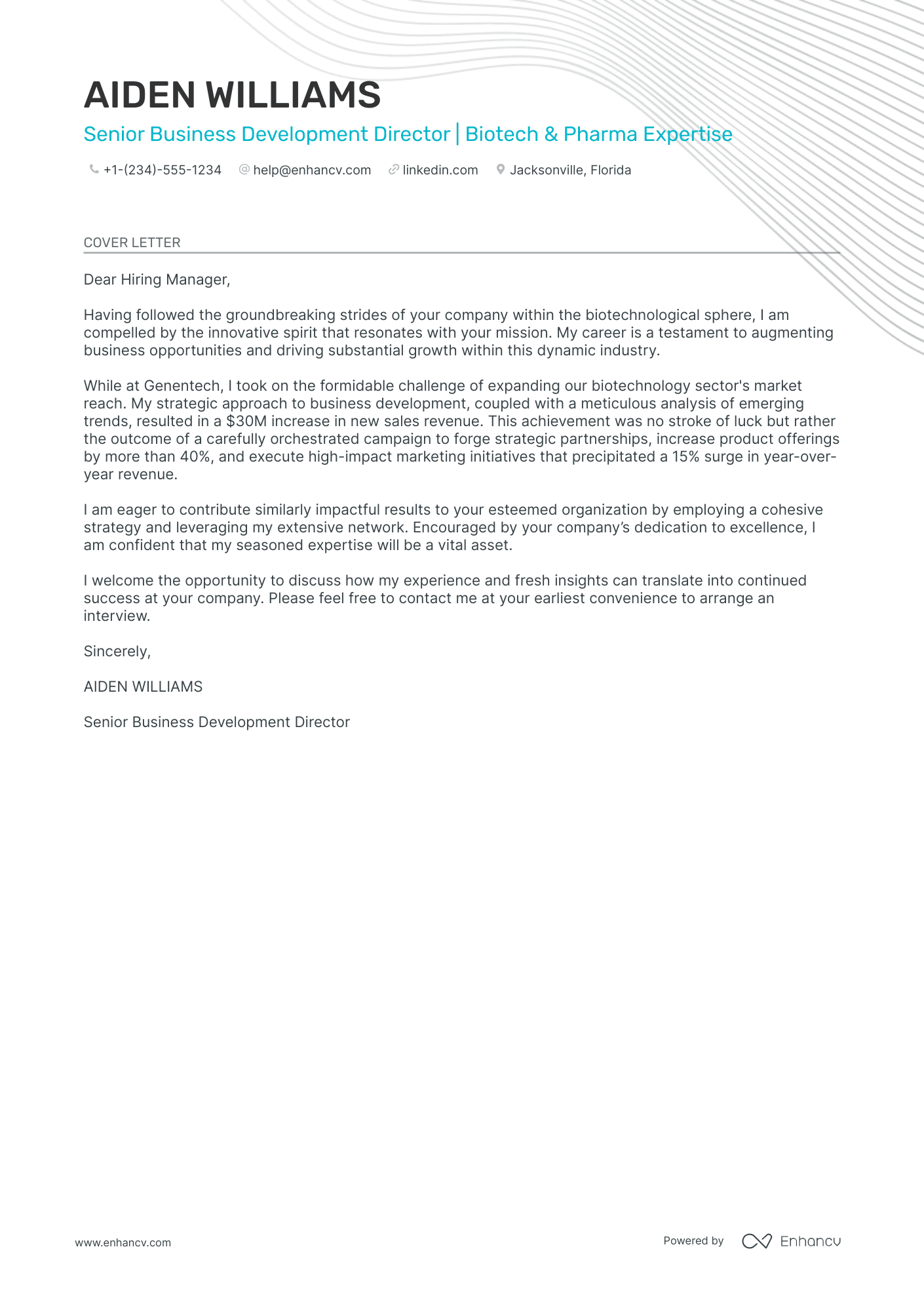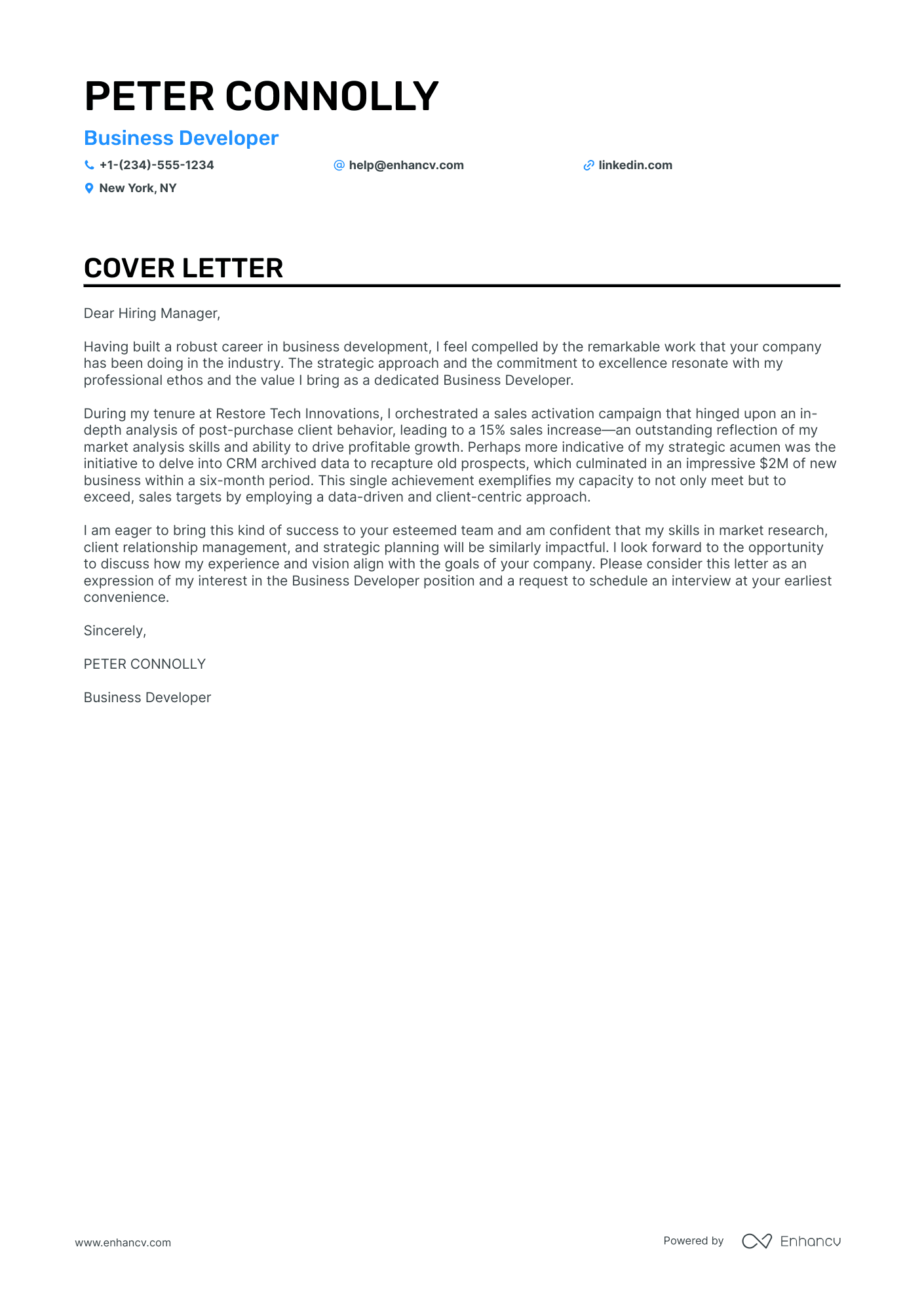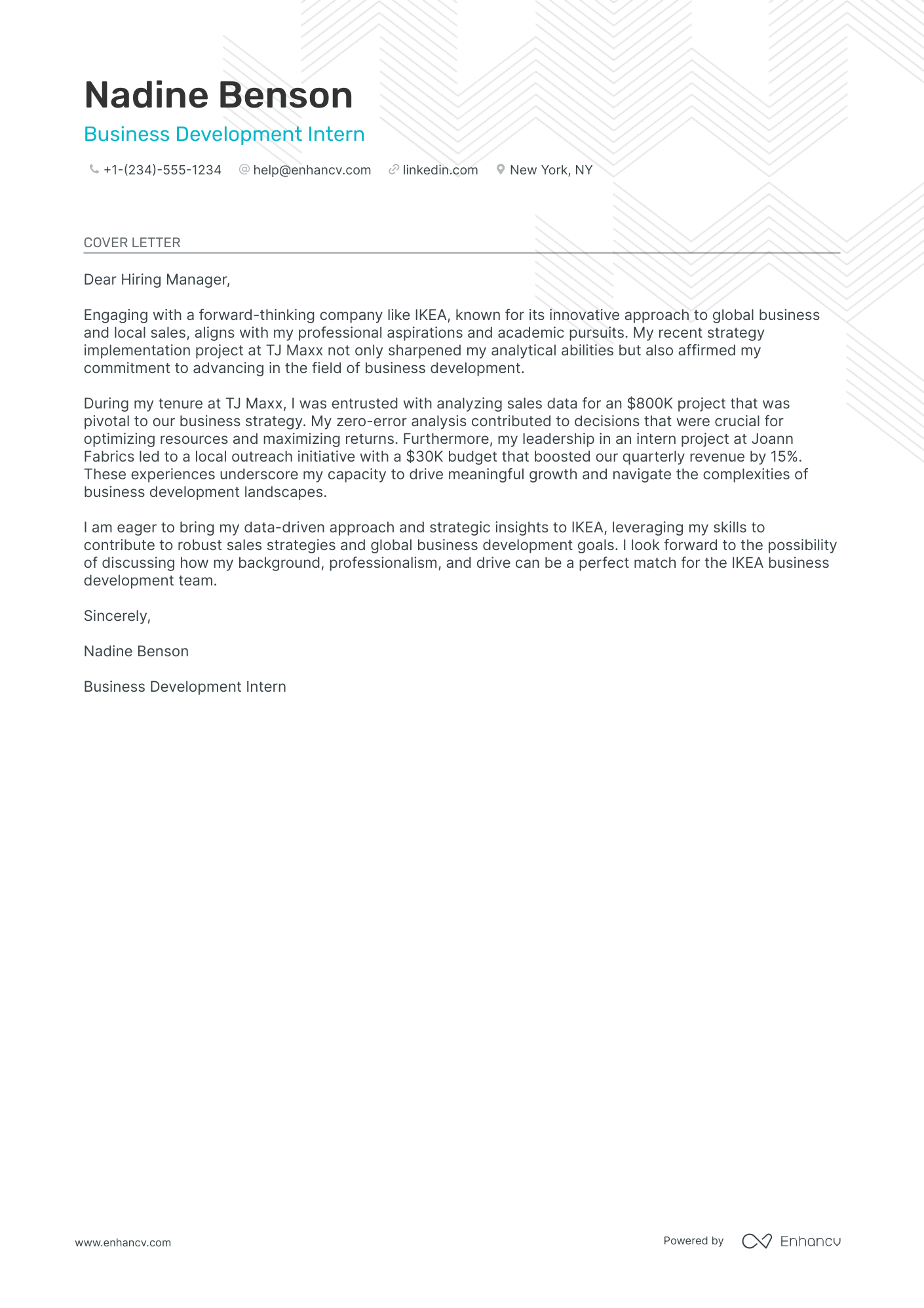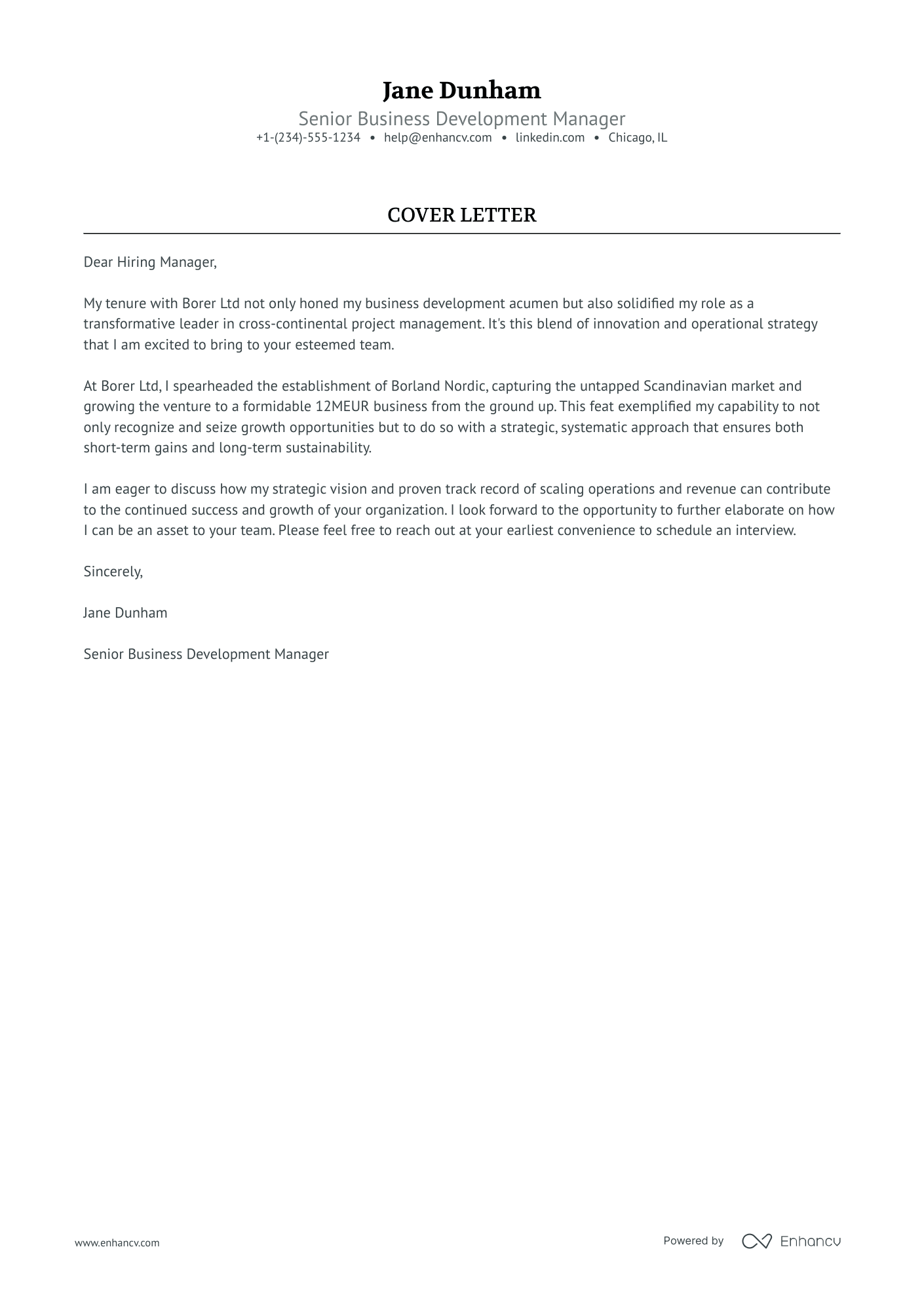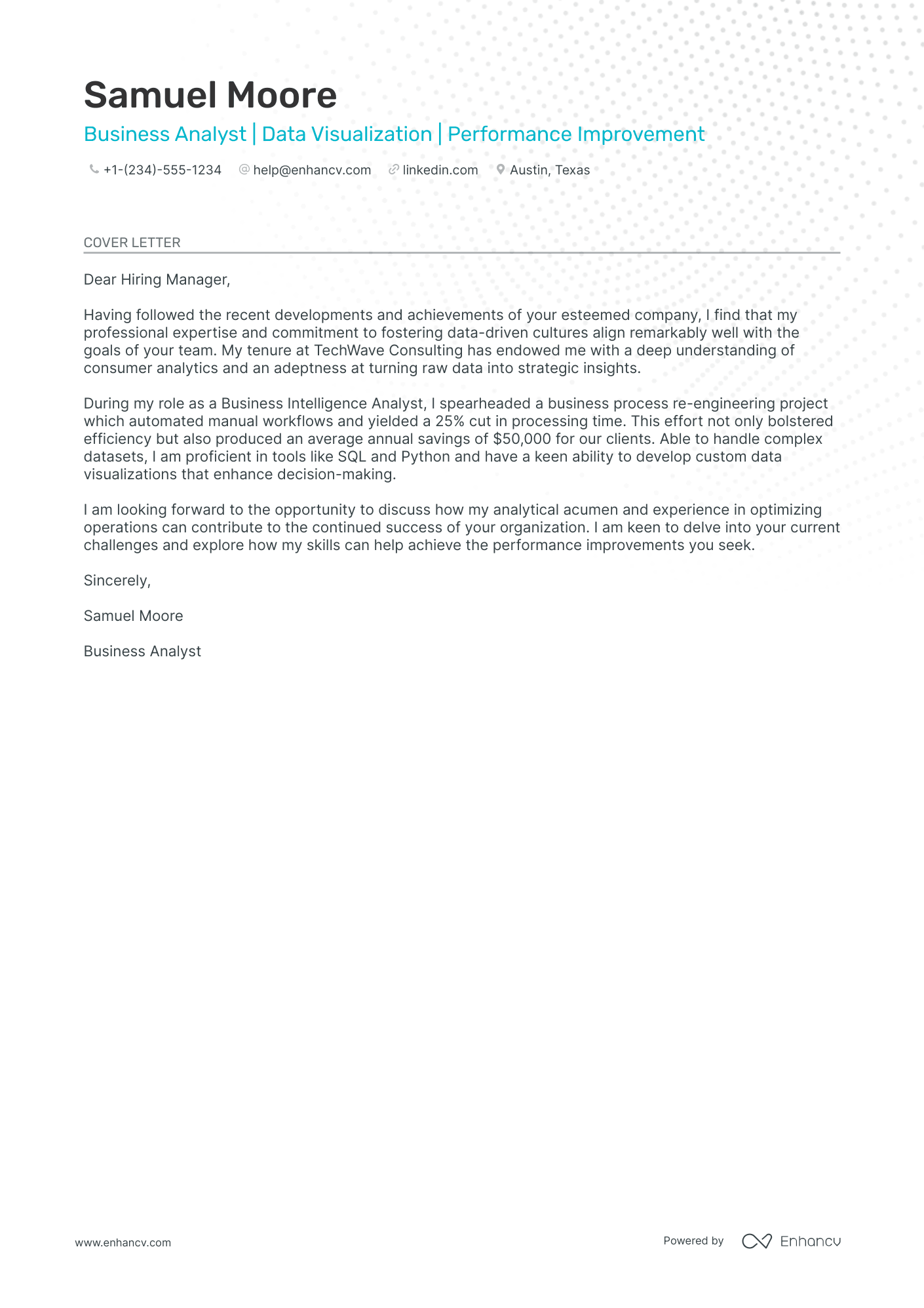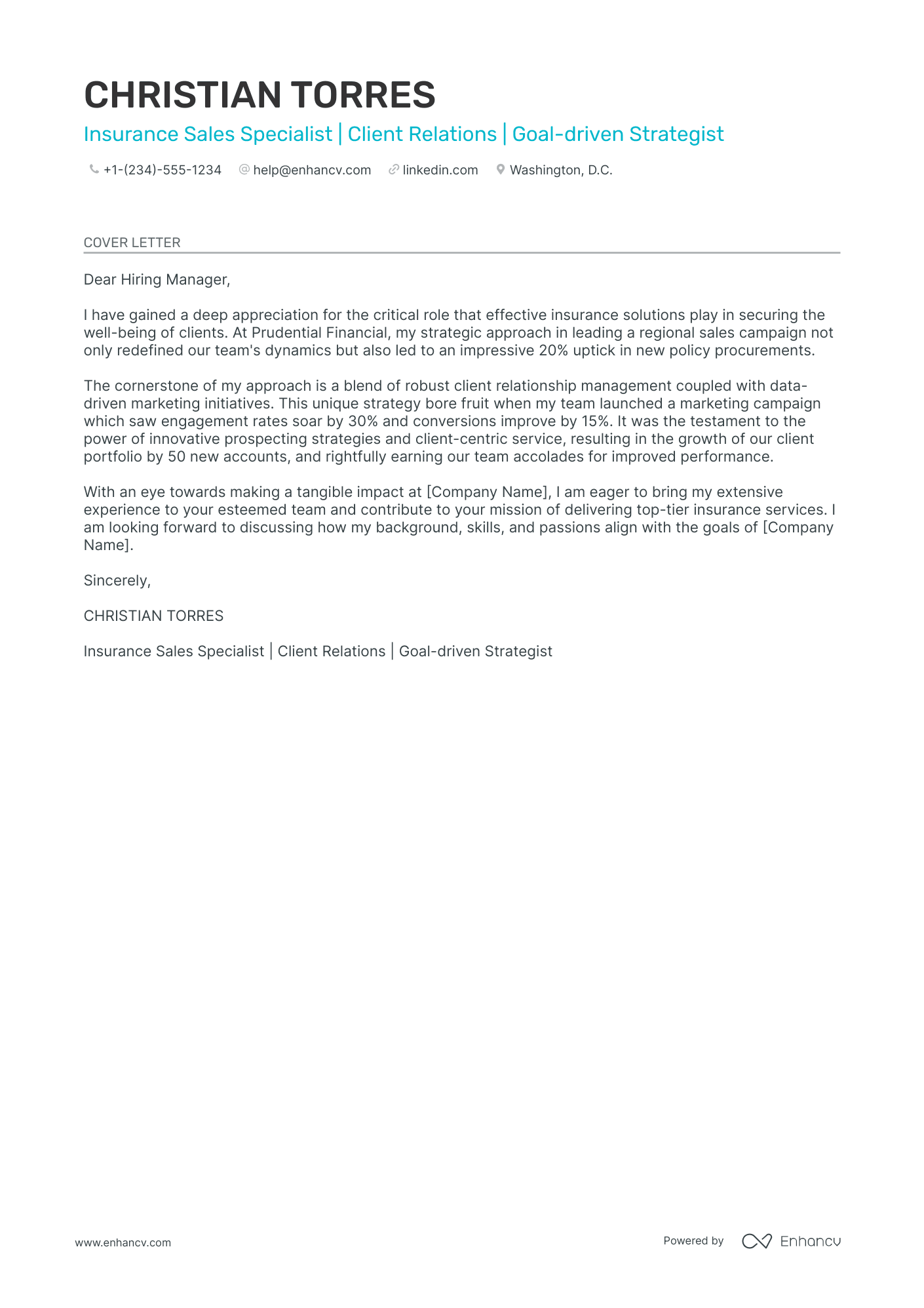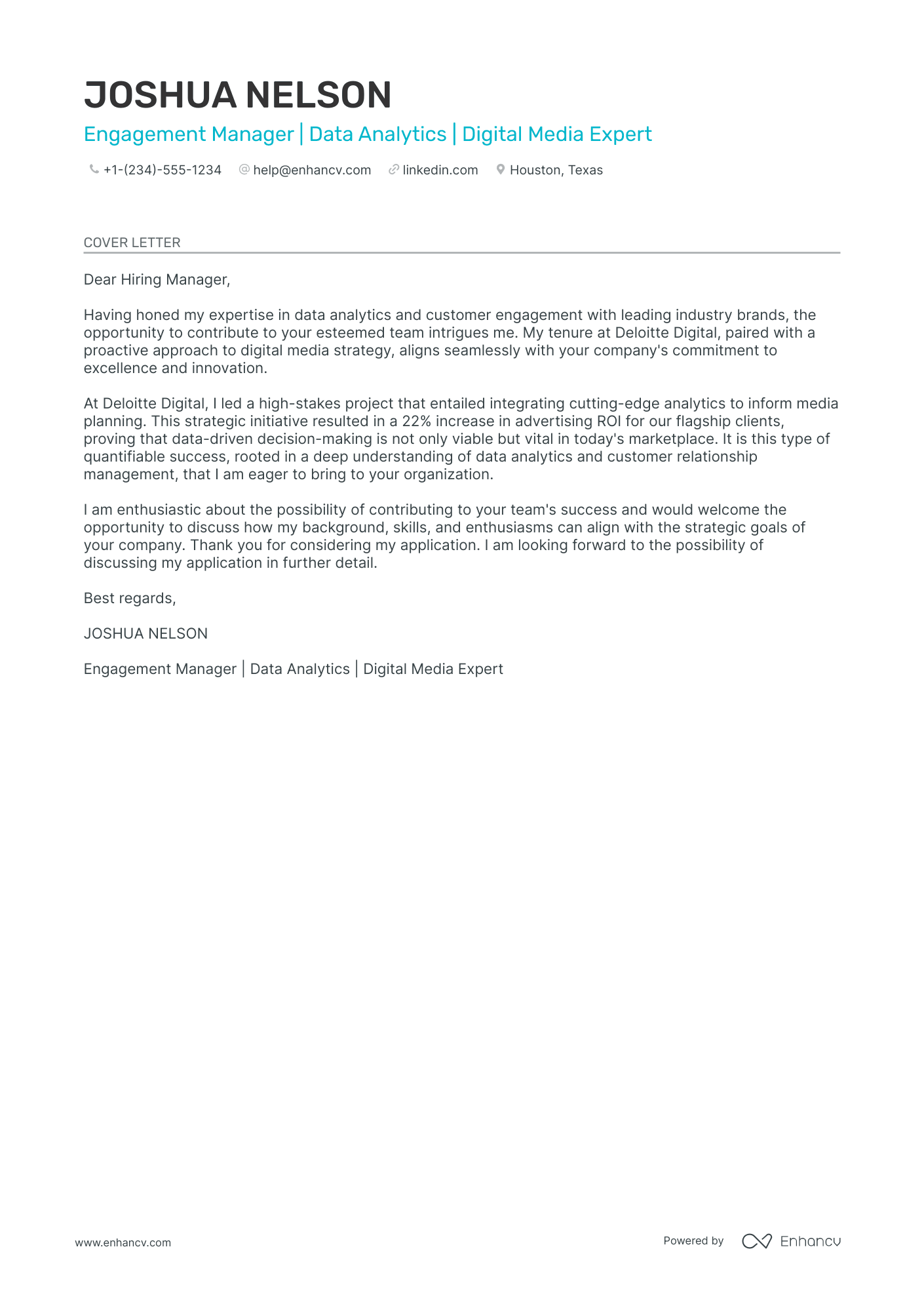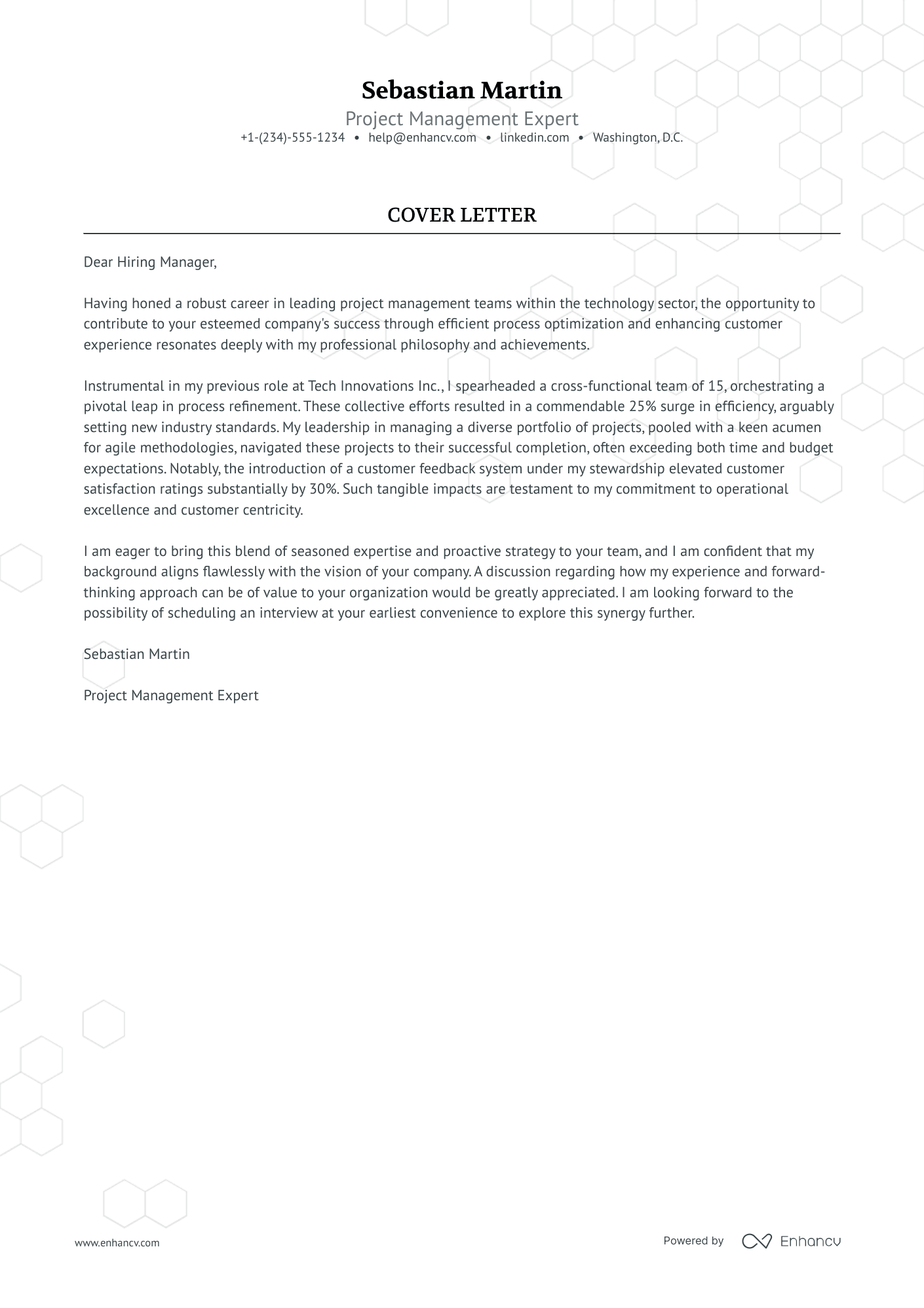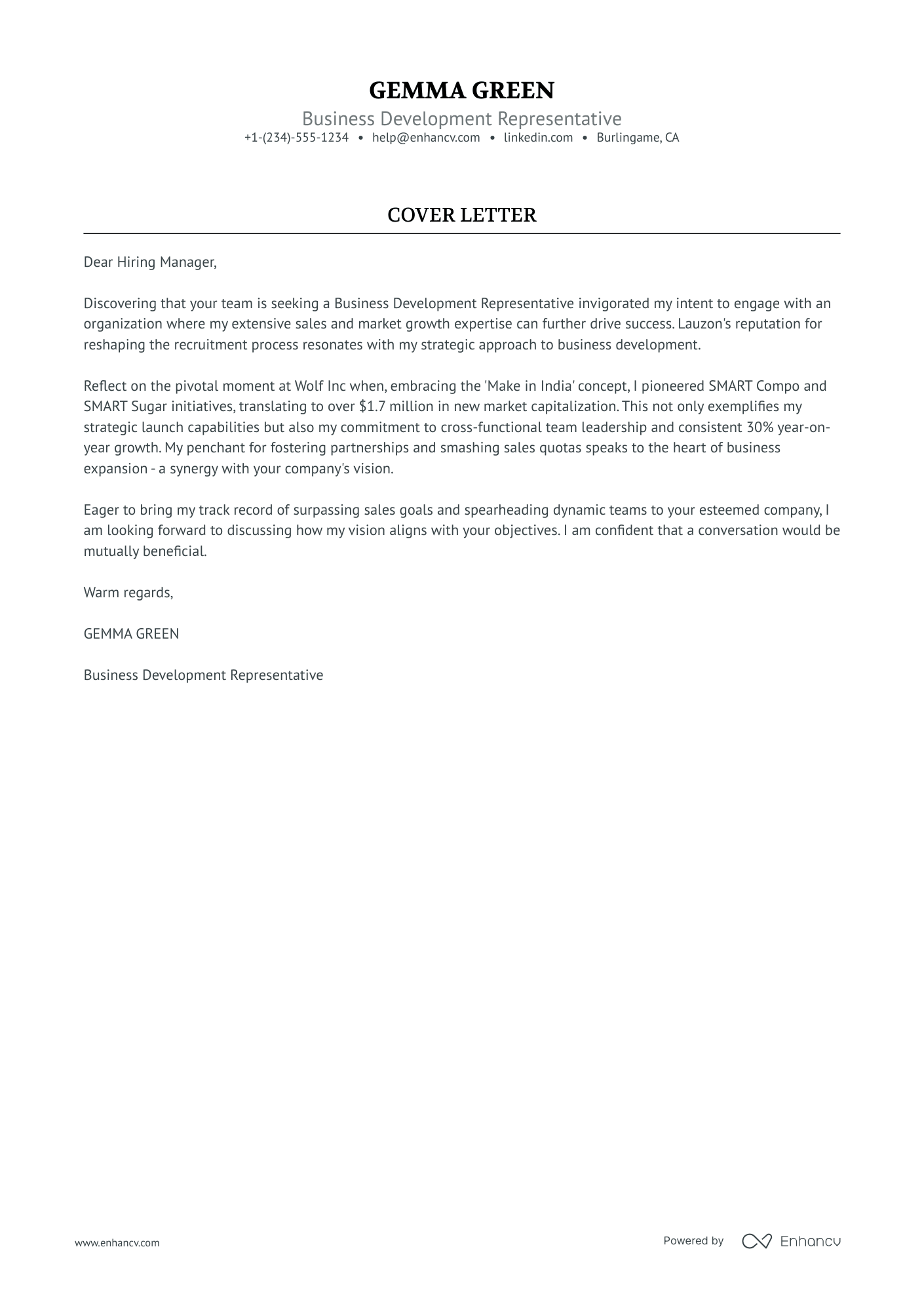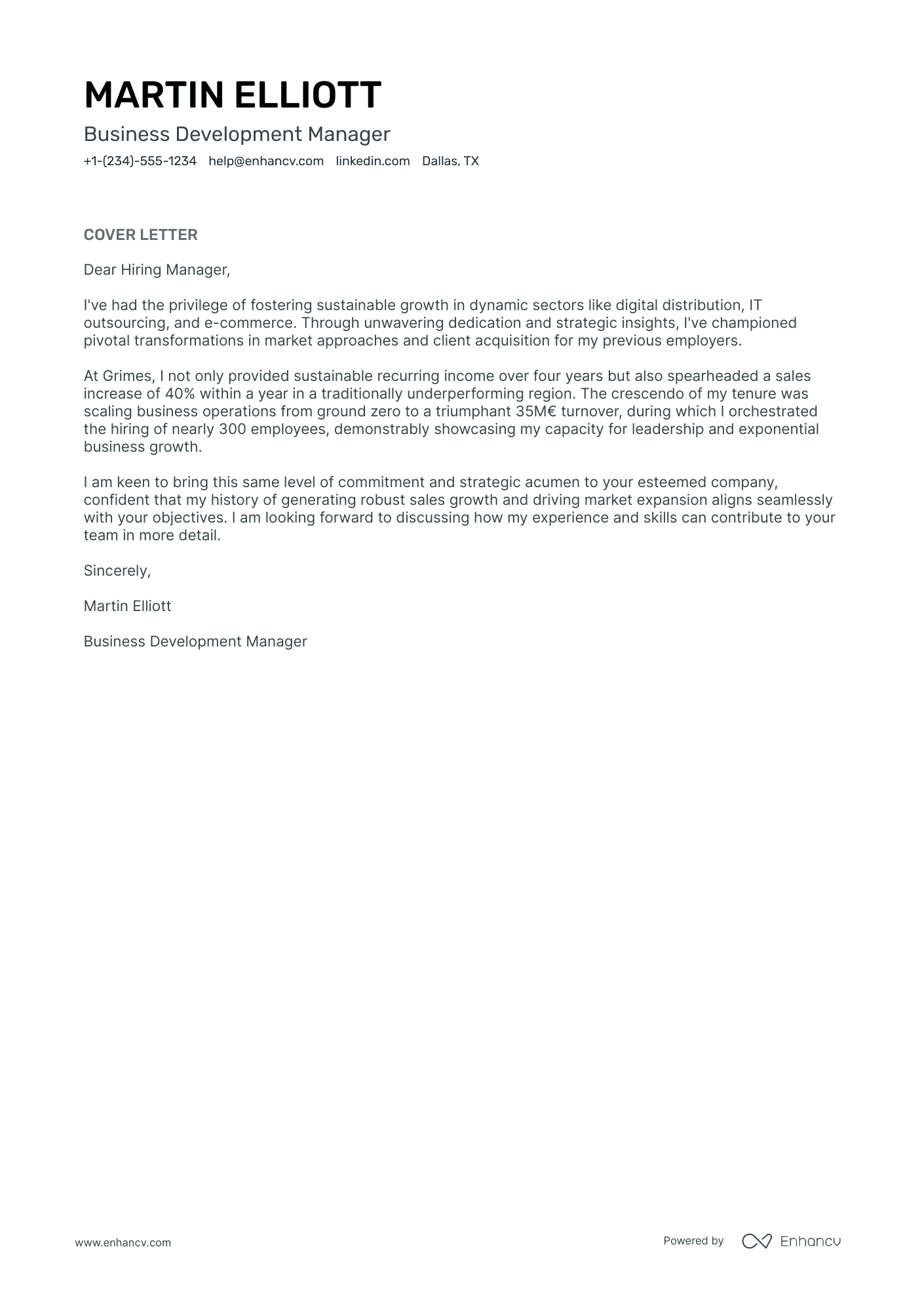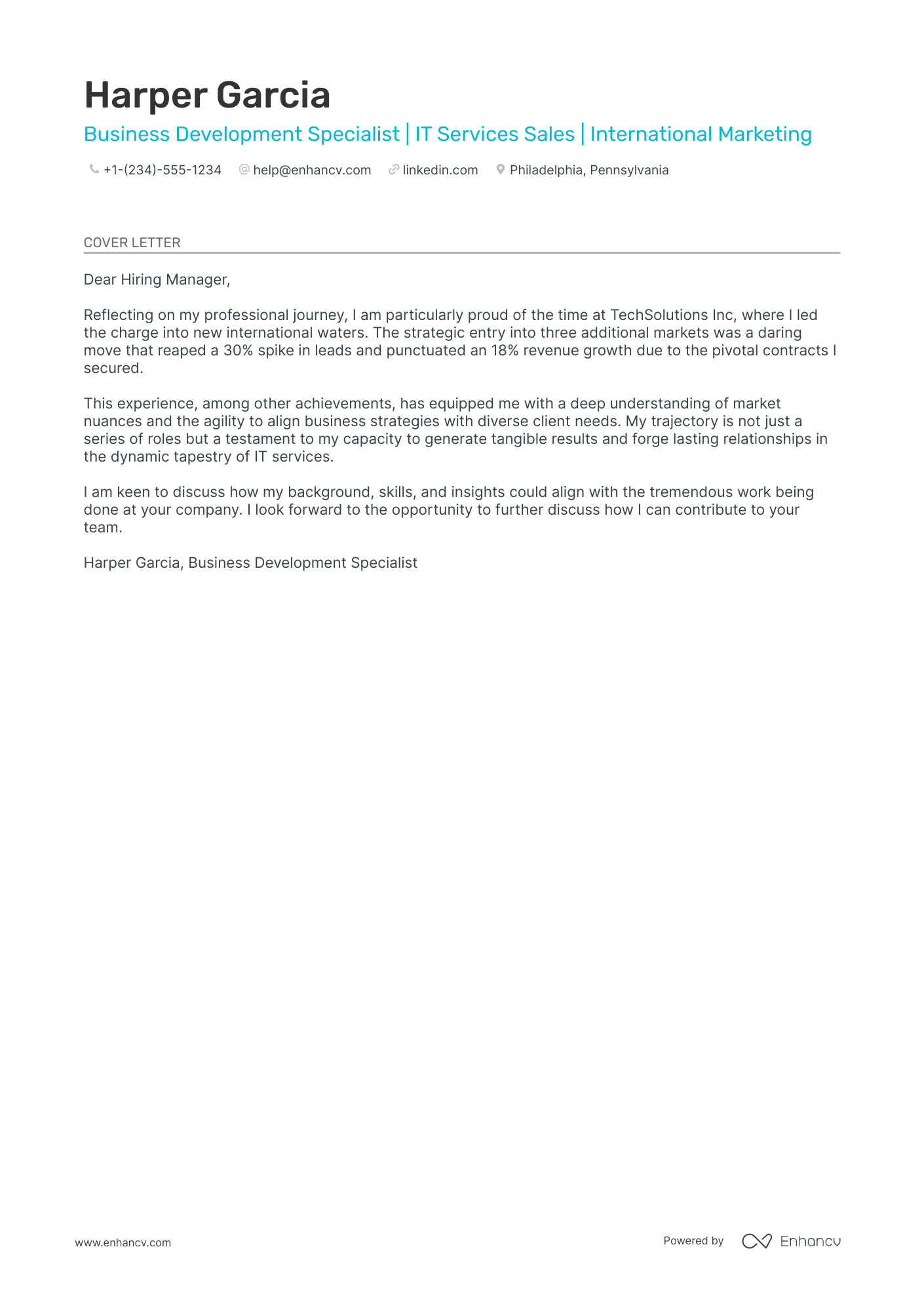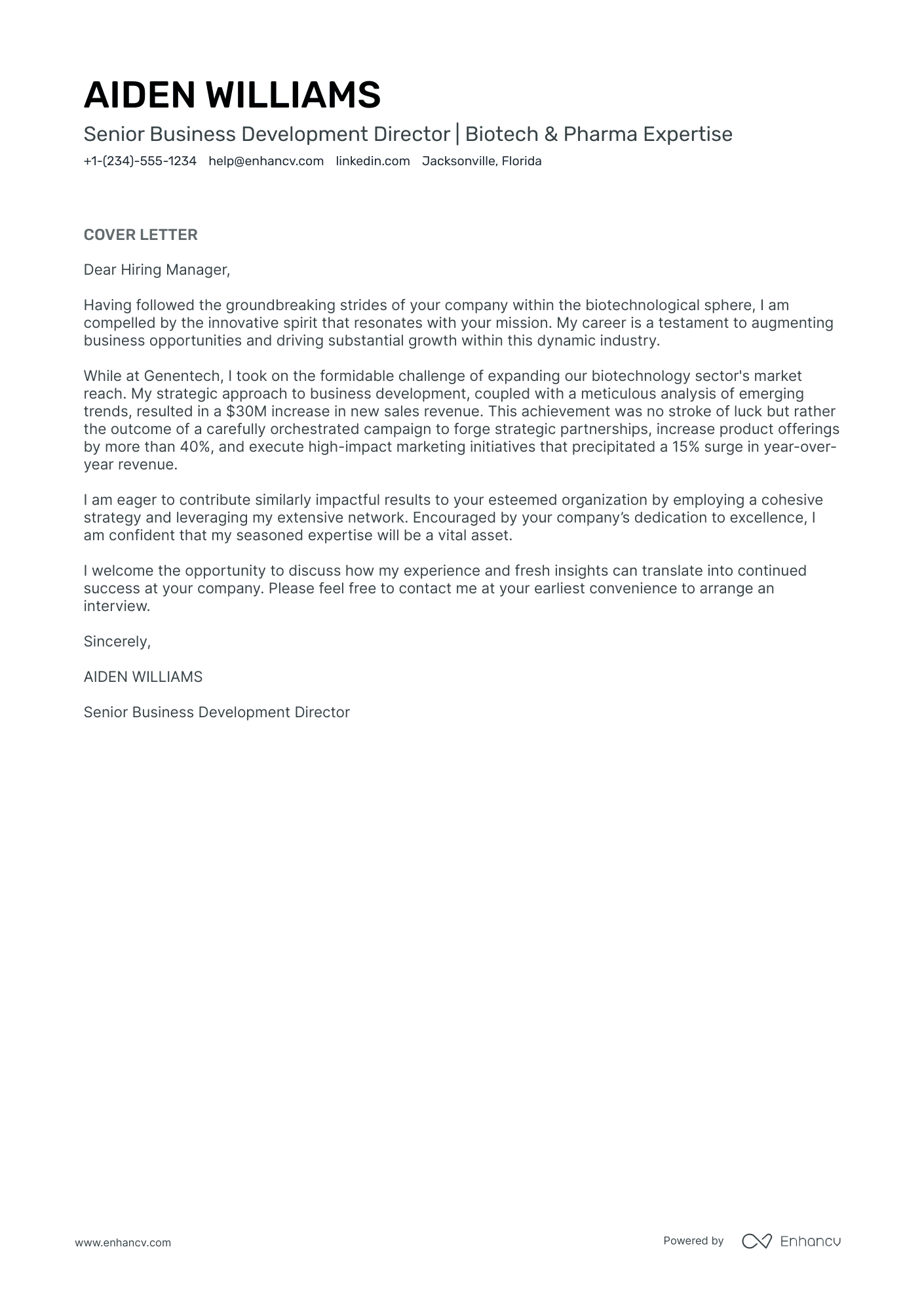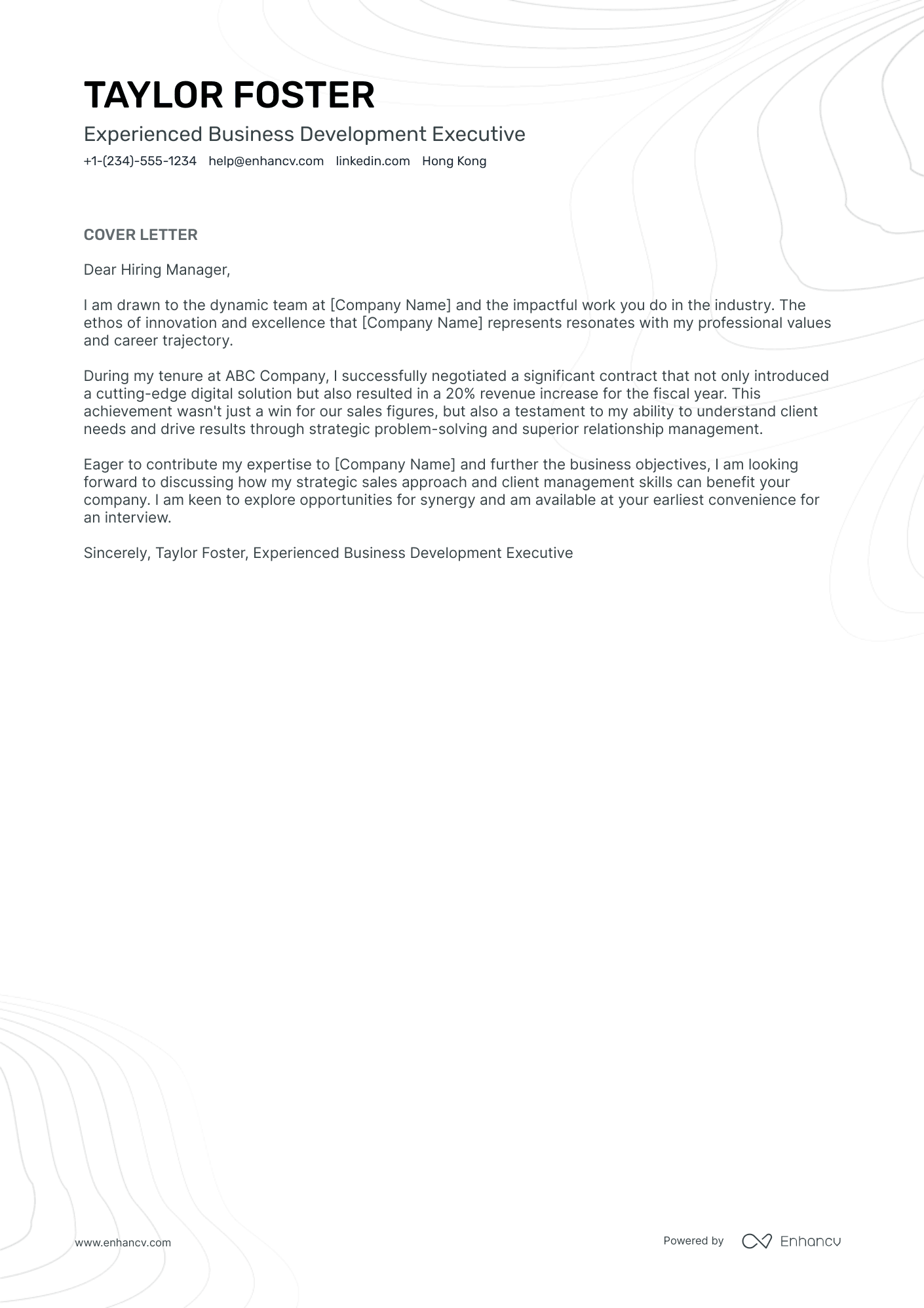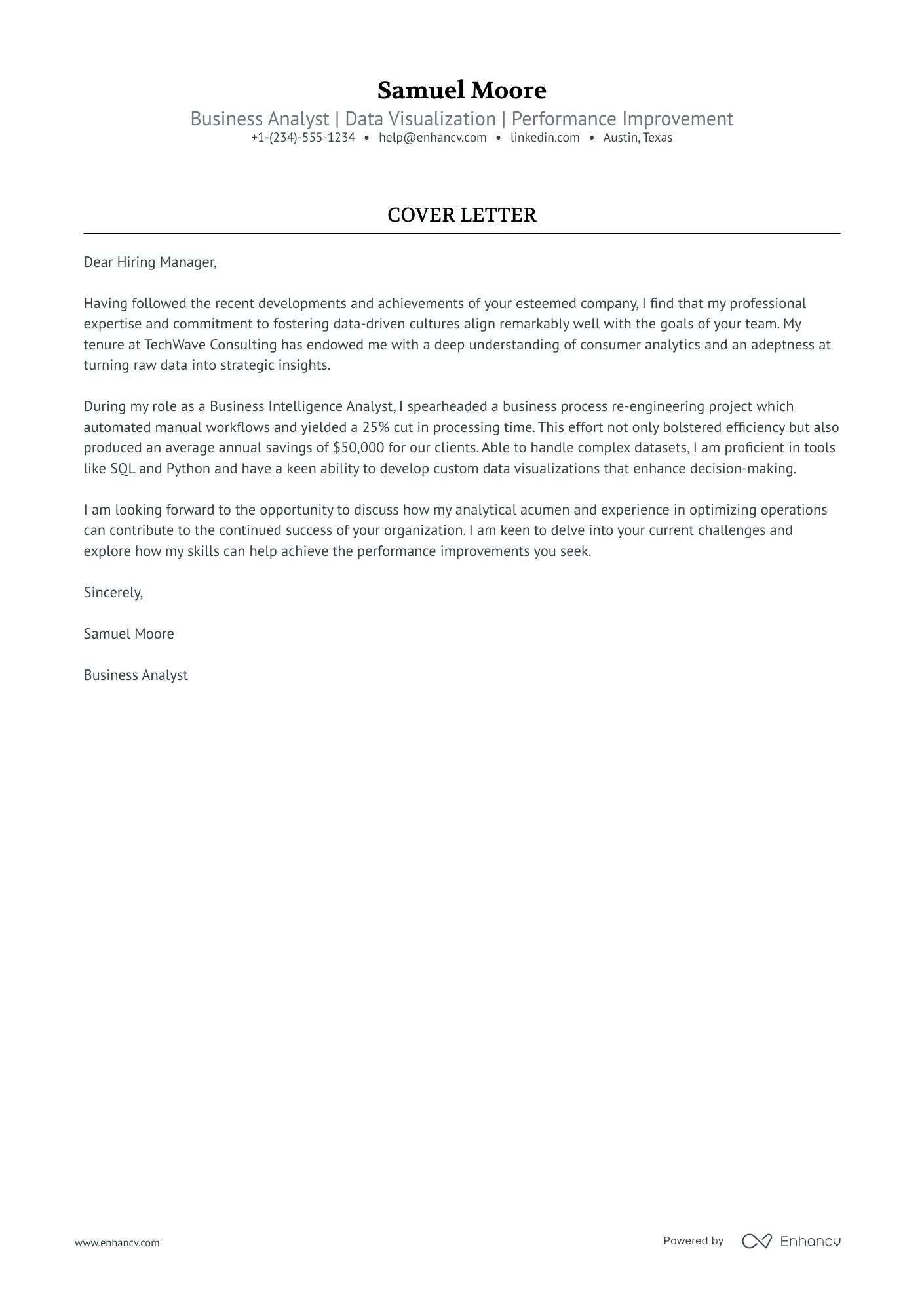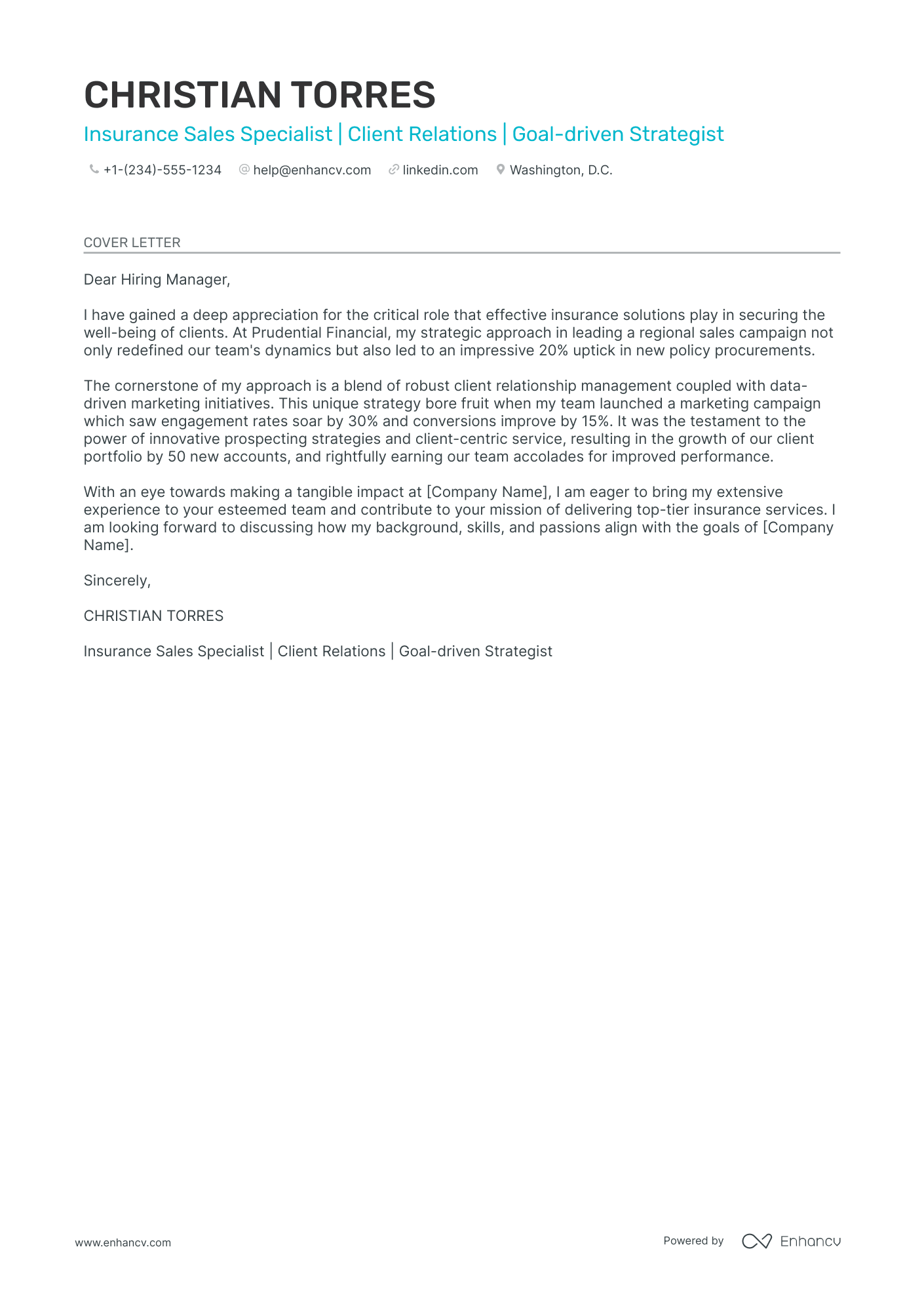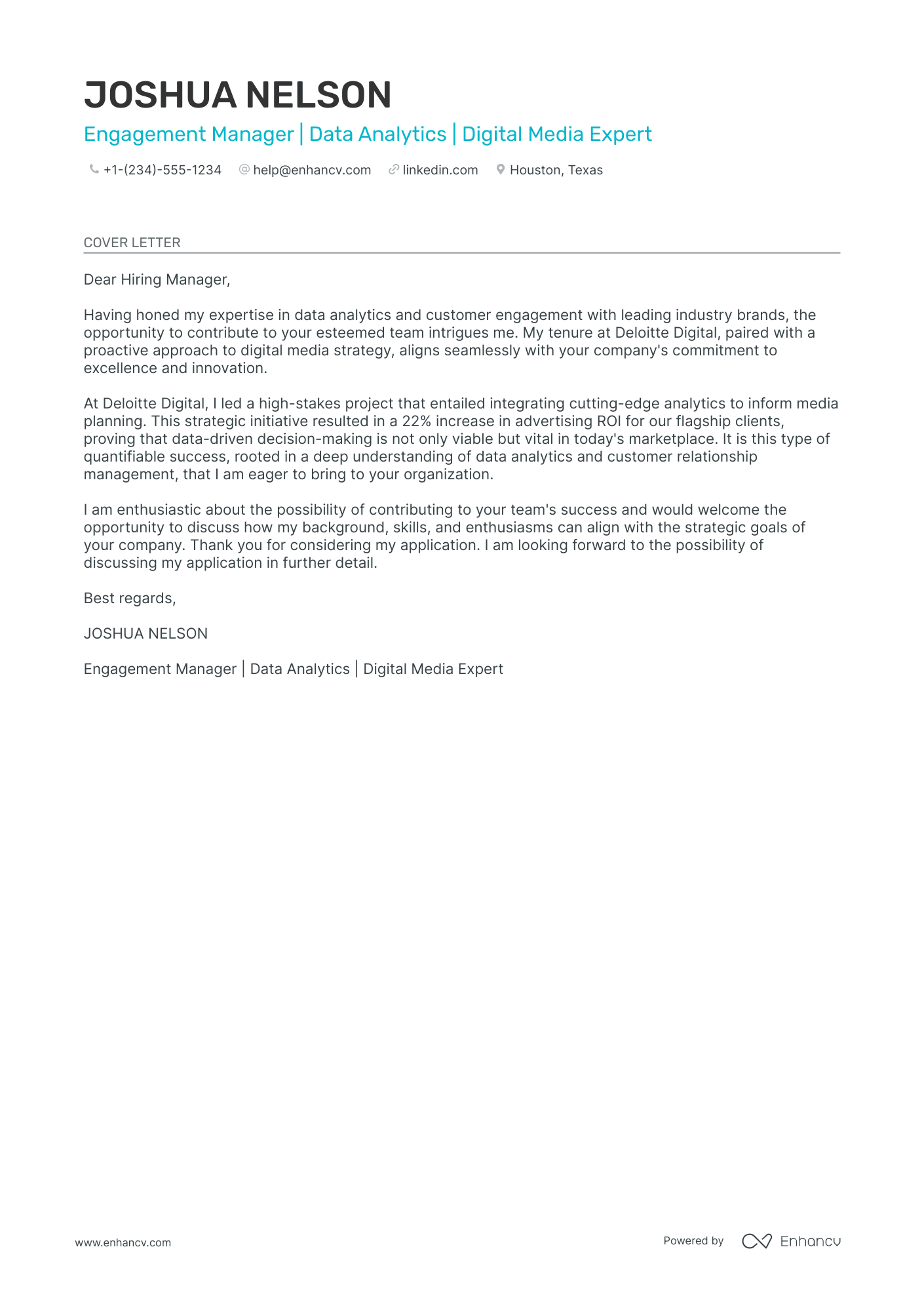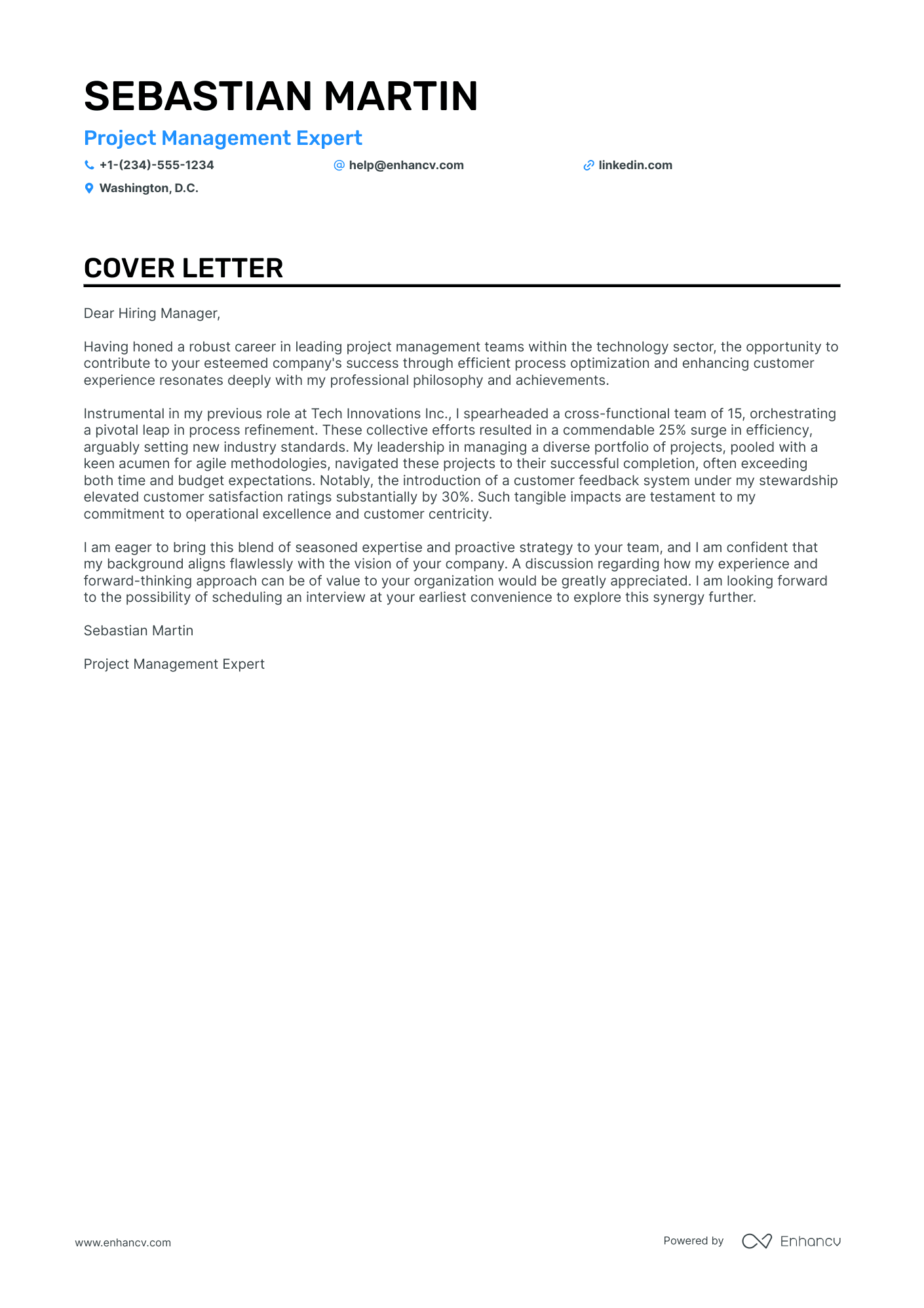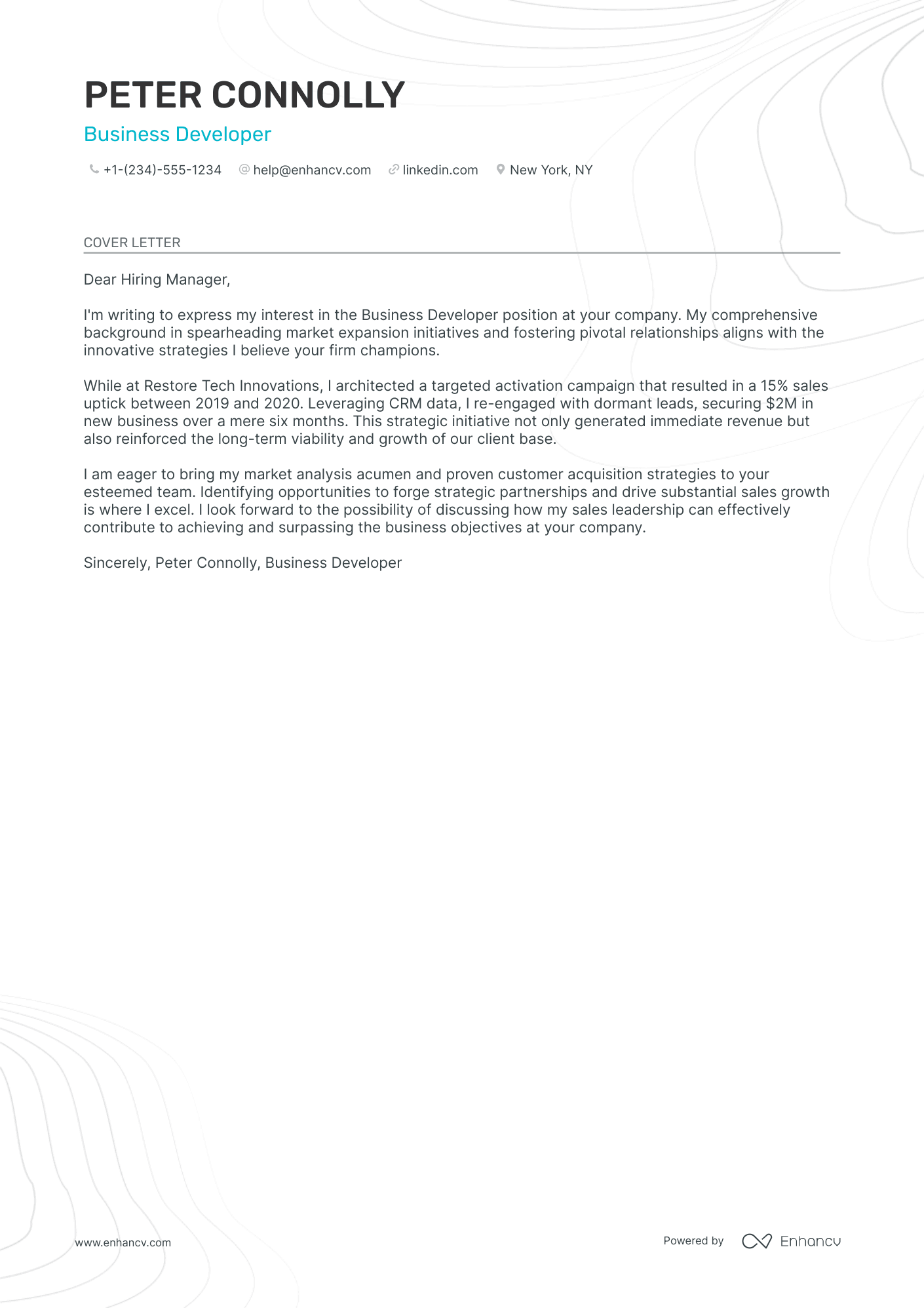Embarking on your job hunt, you've discovered that a standout business development cover letter can make all the difference. It's tempting to rehash your resume, yet your cover letter should be a window into your proudest professional moment, narrating the journey of that one significant achievement. Striking a balance between formal tone and fresh, engaging content without resorting to clichés is key. Remember, brevity is your ally; keep it concise and impactful within a single page. Let's ensure yours grabs attention for all the right reasons.
- Some inspiration from other professionals' job-winning cover letters;
- The best structure and format for your business development cover letter;
- Insights on how to write about your best achievement to stand out;
- A creative twist on your business development cover letter intro.
Upload your business development resume to Enhancv's AI, which will quickly scan and prepare a job-winning cover letter for you.
If the business development isn't exactly the one you're looking for we have a plethora of cover letter examples for jobs like this one:
- Business Development resume guide and example
- Planning Manager cover letter example
- Online Business Owner cover letter example
- Fitness General Manager cover letter example
- Revenue Cycle Manager cover letter example
- Business Intelligence cover letter example
- Market Analyst cover letter example
- Floor Manager cover letter example
- Club Manager cover letter example
- Business Process Manager cover letter example
- Business Data Analyst cover letter example
Drop your resume here or choose a file.
PDF & DOCX only. Max 2MB file size.
Business development cover letter example
PETER CONNOLLY
New York, NY
+1-(234)-555-1234
help@enhancv.com
- Quantifiable Achievements: The cover letter includes specific examples of achievements, such as "leading to a 15% sales increase" and "culminating in an impressive $2M of new business," which provide concrete evidence of the candidate's ability to deliver results in business development.
- Relevant Experience: Describing the management of a sales campaign and utilization of CRM data to recapture old prospects demonstrates the candidate's relevant skill set and experience, tailored to the business development role.
- Problem-Solving Skills: By emphasizing strategic initiatives such as an in-depth analysis of post-purchase client behavior, the candidate showcases their problem-solving skills and ability to adopt a data-driven approach to improving sales processes.
- Client Relationship Management: Mentioning the focus on client-centric strategies and engagement with CRM activities, the cover letter reflects an understanding of the importance of maintaining and expanding client relationships in business development.
Designing your business development cover letter: what is the best format
Let's start with the basics, your business development cover letter should include your:
- Header
- Greeting
- Introduction
- Body paragraph
- Closing statement
- Signature (that's not a must)
Next, we'll move to the spacing of your business development cover letter, and yes, it should be single-spaced (automatically formatted for you in our cover letter templates).
Don't go for a old-school font (e.g. Arial or Times New Roman), but instead, pick an ATS-favorite like Chivo, Volkhov, or Raleway, to stand out.
Our cover letter builder is also set up for you with the standard one-inch margin, all around the text.
Finally, ensure your business development resume and cover letter are in the same font and are submitted in PDF (to keep the formatting in place).
P.S. The Applicant Tracker System (or ATS) won't be assessing your [job] cover letter, it's solely for the recruiters' eyes.
Tight on time? Our free cover letter generator helps you create a cover letter instantly from your resume.
The top sections on a business development cover letter
- Header with Contact Information: Include your name, address, phone number, and email to make it easy for the recruiter to reach out to you, and it lends a professional look to your cover letter.
- Opening Greeting: Addressing the hiring manager by name shows you've done your research and creates a personal connection right from the start.
- Introduction: Briefly state your interest in the Business Development position and why you are a strong candidate, capturing the recruiter’s interest to read further, showing enthusiasm and knowledge about the company.
- Body detailing relevant experience and skills: Highlight your track record in sales growth, partnerships, or market expansion, as these are critical business development outcomes, and use this section to demonstrate how your skills and experiences align with the role’s requirements.
- Closing with a Call to Action: Finish by reiterating your interest in the position, thanking the reader for their time, and suggesting a meeting or call for further discussion, showing initiative and eagerness to move forward in the process.
Key qualities recruiters search for in a candidate’s cover letter
- Strategic thinking skills: To devise actionable plans that align with the company's goals and market opportunities.
- Proven track record in sales or partnerships: To demonstrate the ability to drive revenue growth and build valuable business relationships.
- Strong networking abilities: For identifying and leveraging new business opportunities and partnerships.
- Excellent communication and negotiation skills: To articulate value propositions and negotiate deals effectively.
- Understanding of market research and analysis: To gather insights into industry trends and potential growth areas.
- Adaptability and learning agility: To navigate changing markets and continuously evolve business strategies.
Kick off your business development cover letter: the salutation or greeting
When writing your business development cover letter, remember that you're not writing for some complex AI or robot, but for actual human beings.
And recruiters, while on the lookout to understand your experience, would enjoy seeing a cover letter that is tailored to the role and addresses them. Personally.
So, if you haven't done so, invest some time in finding out who's the hiring manager for the role you're applying to. A good place to start would be LinkedIn and the corporate website.
Alternatively, you could also get in touch with the company to find out more information about the role and the name of the recruiter.
If you haven't met the hiring manager, yet, your business development cover letter salutation should be on a last-name basis (e.g. "Dear Mr. Donaldson" or "Dear Ms. Estephan").
A good old, "Dear HR Professional" (or something along those lines) could work as your last resort if you're struggling to find out the recruiter's name.
List of salutations you can use
- Dear Hiring Manager,
- Dear [Recipient's Name],
- Dear Mr./Ms./Dr. [Last Name],
- Dear Members of the [Team Name] Team,
- Dear [Department] Department,
- Dear Search Committee,
Get creative with your business development cover letter introduction
Recruiters are going to assess plenty of candidate profiles for the role. Thus, anything you do to stand out will win you brownie points.
Use your business development cover letter introduction to share something memorable about your experience.
But before you go down the rabbit hole of creativity and humor, align your message with the company culture.
For example, if you are applying for a role in some startup, use those first two sentences to tell a funny story (about your experience) to quickly connect with the recruiter.
What comes next: your business development cover letter middle paragraphs
In the next three to six paragraphs (or the body of your business development cover letter) you have to prove your unique value.
Most candidates tend to mess up at this stage. They tend to just copy-paste information from their resume.
That's one big no-no.
Remember that when writing your business development cover letter, it has to be personalized. And, your ultimate aim is to catch the recruiter's eye.
So, look back on key job requirements and write down a list that includes the ones you cover.
Next, select just one key achievement from your professional (or personal) history that meets those advert keywords.
Narrate a story around how you've grown your skill set and knowledge. Also, aim to show the unique understanding or soft skills you bring about, thanks to your past success.
Two ideas on how to end the final paragraph of your business development cover letter
Closing your business development cover letter, you want to leave a memorable impression on recruiters, that you're a responsible professional.
End your cover letter with how you envision your growth, as part of the company. Make realistic promises on what you plan to achieve, potentially, in the next six months to a year.
Before your signature, you could also signal hiring managers that you're available for the next steps. Or, a follow-up call, during which you could further clarify your experience or professional value.
Keep this in mind when writing your zero experience business development cover letter
Even though you may not have any professional experience, your business development cover letter should focus on your value.
As a candidate for the particular role, what sort of skills do you bring about? Perhaps you're an apt leader and communicator, or have the ability to analyze situations from different perspectives.
Select one key achievement from your life, outside work, and narrate a story that sells your abilities in the best light.
If you really can't think of any relevant success, you could also paint the picture of how you see your professional future developing in the next five years, as part of the company.
Key takeaways
Winning at your job application game starts with a clear and concise business development cover letter that:
- Has single-spaced paragraphs, is wrapped in a one-inch margin, and uses the same font as the business development resume;
- Is personalized to the recruiter (using their name in the greeting) and the role (focusing on your one key achievement that answers job requirements);
- Includes an introduction that helps you stand out and show what value you'd bring to the company;
- Substitutes your lack of experience with an outside-of-work success, that has taught you valuable skills;
- Ends with a call for follow-up or hints at how you'd improve the organization, team, or role.
Business Development cover letter examples
By Experience
Business Development Executive
Director of Business Development
VP Business Development
Entry Level Business Developer
Business Development Intern
Senior Business Development Manager
By Role
